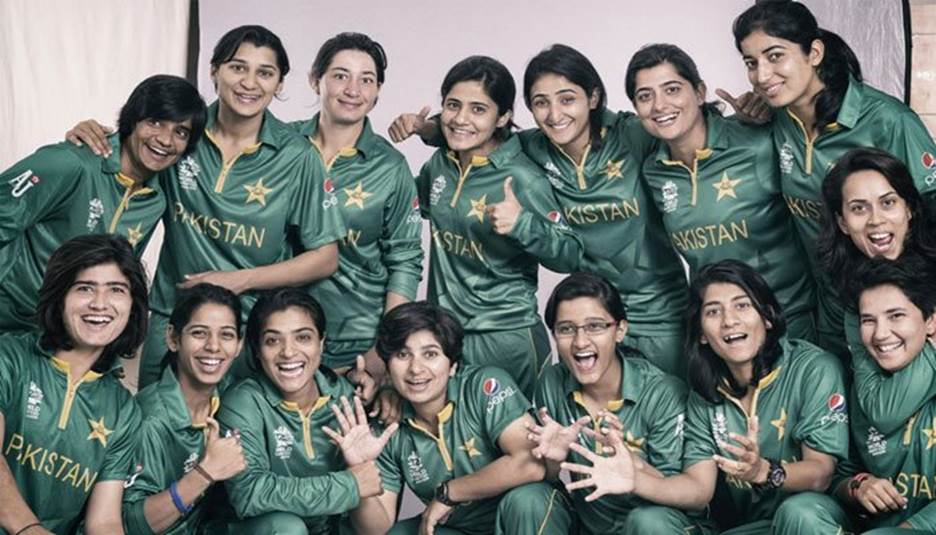
There is talent in every street; the talent needs structure, facilities, opportunities, acceptance and celebration. Bismah Maroof, Javeria Khan, Anita Karim, Jahanara Nabi and many others need to be household names if we want the gender bias in sports to end. – Picture courtesy The Express Tribune
Unsung Heroes
By Tahera Hasan
The Men’s T20 World Cup was watched with bated breath and immense anxiety. Would Pakistan make it through the various stages? Would there be a Pakistan-India final? Excitement and anxiety were felt by young and old alike, with the country invested in the men in green. Across class and age, we all know the names of the men in the cricket team, the details of their families, their strengths and weaknesses; and we have immense belief in and support their capabilities. The wins and celebrations are personal; so are the failures and heartbreak.
Parallel to that, we have the ODI series where the Pakistan women’s cricket team gave a brilliant performance, winning a series of matches, with some players getting accolades for their skill and expertise. But the commitment to them is just not the same — from the audiences, the sports authorities, and the sponsors. Perhaps just a fraction of young people know the name of the Pakistan women’s cricket team captain, or any other sportswoman who is breaking barriers.
The state of sports in Pakistan in terms of government support, structure, system, facilities, and opportunities is dismal, to say the least. Even young men struggle with the same issues when they set out on the sporting path. Add to this complex landscape the element of gender, and automatically it becomes one of those practically unattainable dreams. There is an immense void in the area of mentorship, and there’s a perception that women are weak and that men have greater strength and ability to compete. This results in the marginalization of women’s sports overall — more specifically, from the viewpoint of investment.
Sports has not been a profession of choice in our culture, and the acceptability of women participating in the arena is, to date, a struggle. Sports can only be undertaken by those who feel passionately — more so when it comes to women, as it means pushing social and cultural boundaries, looking for acceptance, and at times being shunned by family and society. There are enough examples of sportswomen who have endured social ostracization and death threats, and have had to pretend they were males to be able to pursue their dreams, their passion and career of choice. But even after giving it their all, they are still struggling for acceptance, equality, equal rights and benefits.
In recent years, there has been a visible increase in the number of women who are attaining success in cricket, tennis, athletics, swimming and the martial arts, to name a few. There are now many cases of individual sportswomen who, against all odds, are making their presence felt, achieving, excelling and striving to give it their best. These women, due to their grit and perseverance, are role models for younger generations and an immense source of pride.
The strengthening of sports programs at the school level is key — in both government and private schools — and continuing to the high school level, while including girls in sporting activities even if they are not traditionally, in our culture and society, considered viable. Government investment in sports facilities must specifically keep women’s sports as a focus area. Sportswomen must be given equal importance by the government and facilities and training for them be made a priority. Also, the creation of safe spaces where women can learn, grow and play is essential. Wide-scale public awareness programs and engagement on the issue of women in sports can change perceptions.
Working with young children, especially girls, and that too in an underprivileged community, I have been witness to the impact sports can have on the development and mental well-being of young people. It teaches them discipline, strength of character and unity. However, the challenge they face due to their gender and the lack of facilities, coaches, opportunity and government investment are also a stark reality that holds them back from progressing after a certain level.
We can achieve great heights in women’s sports by normalizing and supporting women’s participation in sports -– by being inclusive. There is talent in every street; the talent needs structure, facilities, opportunities, acceptance and celebration. Bismah Maroof, Javeria Khan, Anita Karim, Jahanara Nabi and many others need to be household names if we want the gender bias in sports to end. It would enable many others to draw courage and strength to follow their dreams. Young women in sports in Pakistan today are setting the stage for generations to come. They are creating the room for women in sports to prosper and develop. However, this is not enough; there is a need for commitment to women’s sports followed by the equal and fair distribution and investment of resources. Taking ownership of our sportswomen by supporting equal opportunity will change the landscape and give them prominence, resulting in success for those who dare to fight against the odds.
(The writer is a lawyer and founder-director of the Imkaan Welfare Organization – Dawn)

